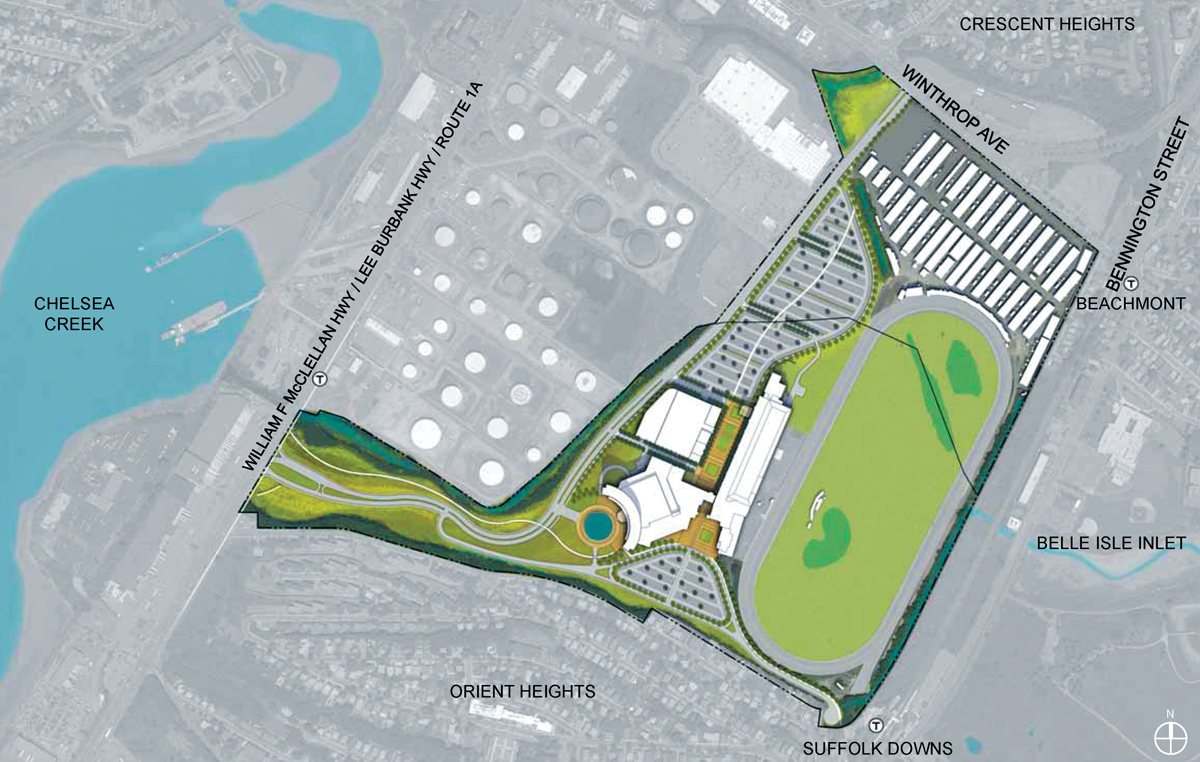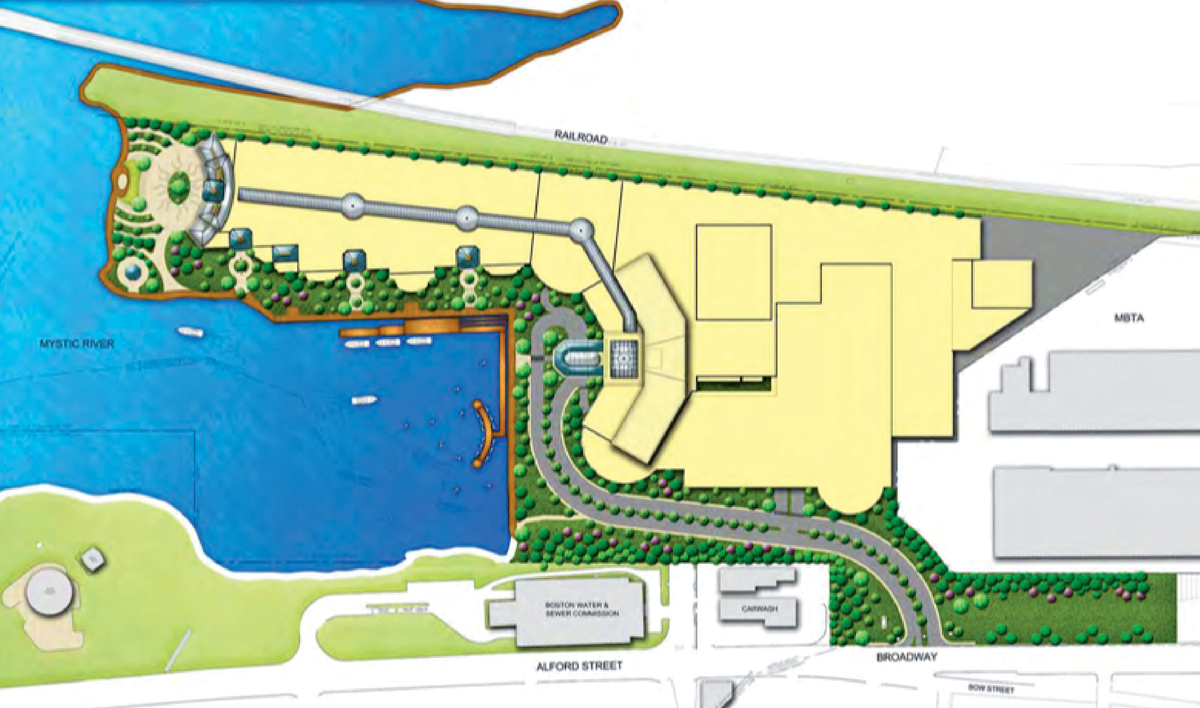Mr. Wynn Comes to Everett

The Suffolk Downs casino would be built alongside the historical East Boston horse track, opened in 1935.

Wynn’s plan for Everett envisions a shopping mall extending out from the casino, toward a waterfront park.
Now it was time to negotiate. The Massachusetts gaming law calls for each casino applicant and its town to create what’s called a host-community agreement, governing how much the casino will pay the city, what traffic improvements will be made, how many jobs will be added, and often much more.
On one side was Wynn Resorts, a multibillion-dollar corporate entity. On the other side was DeMaria, a longtime local politician and self-described baker who owns four Honey Dew Donuts franchises. The matchup was somewhat different across the river, where Menino was in negotiations with Suffolk Downs and Caesars. The mayor of Boston assigned top aides to the project and brought in professional negotiators from the downtown law firm Nutter, McClennen & Fish, plus all sorts of other engineers and consultants. And why not? The gaming law stated that Suffolk Downs, as the casino applicant, had to pay all of the city’s expenses for the process.
Everett brought in a few outside lawyers, but DeMaria’s answer was to draw his top aides in close and handle most of the negotiations himself. Primarily, he dealt with Wynn’s executives, Matt Maddox and Kim Sinatra. “They’d done their research in the market,” DeMaria said. “We started with Matt’s numbers and we went north from there.” He added, “They really try to keep Wynn from talking about money, ’cause I guess he has maybe a soft spot for residents.”
After a while, Maddox and DeMaria reached an impasse over how much cash the casino would pay to Everett—DeMaria wanted more for the city, Maddox said no—and it was left to Wynn to come in and try to personally finish the deal. “There’s a number that’s real,” Wynn told me, pacing around his villa. “And you go past that number”—he kicked at the ground—“you’re a moron, you’re about to destroy the enterprise.”
Wynn by this time had walked over to my seat, and he leaned directly over me as he spoke: “At that point, the mayor and I have to trust one another. Do you think that Steve Wynn is a bullshitter? Do you think Carlo is a bluffer? Are we both trying to do good for our constituencies?” he said. “Somebody’s gotta trust somebody somewhere. And credibility matters for that reason.”
It took five months, but in April the deal was struck. What emerged was a 20-page document, outlining in plain language the relationship between the city and the casino company—provided, of course, that Wynn wins the gaming-license sweepstakes. Wynn Resorts would pay Everett a $30 million one-time fee, plus $25 million each year in impact fees and payments in lieu of taxes, with that number increasing by 2.5 percent annually. Wynn also pledged to “give reasonable preference” to Everett residents when hiring for both construction and permanent jobs. Traffic improvements to Broadway, Santilli Circle, and Sweetser Circle were included as well. The environmental remediation section, meanwhile, is just 36 words long, but here’s an even shorter version: Wynn Resorts says it will clean up the site. The company confirmed to me, in a statement, that it will not ask for public money.
A few weeks later, when the city of Springfield and MGM Resorts released a host-community agreement as part of a bid for the western-region license, the document was more than 100 pages long. Jamie Errickson, Everett’s planning chief, and Dave Rodrigues, a top DeMaria aide, laughed at that agreement’s length. Whereas Springfield had specifically allocated money to different projects in its agreement, Rodrigues said, Everett wanted more flexibility. He and Errickson explained that some details will be worked out with Wynn later. They told me they were not concerned that those provisions wouldn’t be enforceable by law. “Part of this is about building a true trust between the public and private partnership we’re trying to do here,” Errickson said.
“We negotiated a great deal,” DeMaria said. “It’s better than what is there now.” He said he expects that there will be critics, but that doesn’t bother him. “Anyone can play Monday-morning quarterback,” he continued. “I used to bake for a living, and my aunt would always say when I would bring out the honey dips or something, ‘Jesus, can you put more glaze on it?’ Well, you know, why didn’t you do it then if you want more glaze on it?”
With DeMaria and Wynn agreed on a deal, the next step was a June referendum, at which the city’s residents would decide whether to allow the casino. In advance of the vote, Wynn poured some $405,000 into campaigning and get-out-the-vote operations. As part of the effort, the company sent a 50-page book to registered voters in Everett. The first dozen pages focused on Wynn himself, with the rest dedicated to his company’s accomplishments. In the back was a DVD, complete with a dramatically narrated biography of Wynn. (“Even as a boy, Steve had big ideas.” ) He just wanted to provide jobs and build a gorgeous, grand hotel, he explained over and over again, and, oh, by the way, if there’s a casino attached, well, what was the difference? But really, Everett wasn’t being asked to buy into a casino; it was being asked to buy into Steve Wynn.
The referendum passed with unheard-of support: 86.5 percent. For context, a poll from last year found that 81 percent of Massachusetts residents are Red Sox fans. In Everett, Steve Wynn had become more popular than the Red Sox.
Suffolk Downs has been going out of business since at least the 1980s. The 78-year-old track loves to highlight its colorful history, but the truth is, it’s been a long time since horse racing was a viable business in Boston. For the past two decades, Suffolk has limped along, hoping and praying for the big day when it might be able to expand its gambling options beyond horse betting. “Slot machines are very important to us—they can be our salvation,” former track CEO Bob O’Malley told the Globe in 1996. Menino has consistently supported adding slots to the track—it’s co-owned by his buddy, the concessionaire Joe O’Donnell—but it wasn’t until 2007, when the State House debated legalizing casinos, that visions emerged of a full-fledged casino resort. Those plans arrived with Richard Fields, a veteran of Trump casinos, who bought 42 percent of the business, making him Suffolk Downs’ largest shareholder.
Gary Loveman, the CEO of Caesars, has lusted after expanded gambling at Suffolk Downs almost as long as anyone who actually works at the track. A former Harvard Business School professor, his primary residence remains in Wellesley. “I’ve been pursuing that site for 13 years,” he told me. Suffolk Downs is the ideal place for a casino, Loveman said, because of its location beside the airport, its Blue Line access (no subway or trolley runs to Everett), and its 163 acres (126 more than Everett has). So it was no surprise when, in April 2011, seven months before Governor Deval Patrick even signed the casino bill, Suffolk Downs and Caesars announced they would go it together. Caesars would buy into a small share of the track—4 percent—and be contracted to design and operate the prospective casino.
In its slogan, Suffolk Downs calls itself “The Hometown Favorite.” As such, it began grinding out the meetings and glad-handing it would need to build community support. “We’ve literally had hundreds of public meetings and thousands of conversations over the course of the last six years,” said Chip Tuttle, the track’s chief operating officer. There were meetings with local businesses and meetings with minority groups and meetings with veterans. Meetings in Boston and meetings in Chelsea and Revere and Winthrop and Malden and even Gloucester. “If someone had a rubber-chicken dinner, we were happy to be there to tell them about the proposal,” Tuttle said.
In Massachusetts politics, where the personal touch has always made a difference, the approach seemed to be working. Jay Ash, the city manager of Chelsea, which is sandwiched between Everett and Eastie, said he’s throwing his city’s full weight behind Suffolk Downs. “I have a great relationship and even a greater respect for the people who run Suffolk Downs,” he said. “The Wynn people, I don’t know, I have no relationship with them. I’ve never met any of the principals.”


